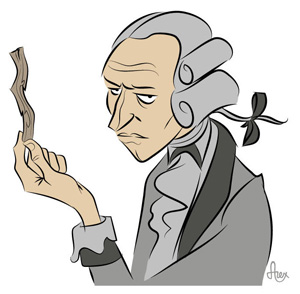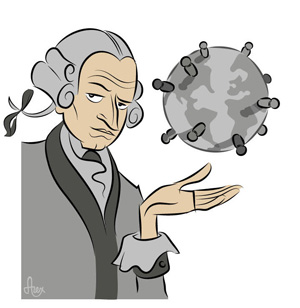
Your complimentary articles
You’ve read one of your four complimentary articles for this month.
You can read four articles free per month. To have complete access to the thousands of philosophy articles on this site, please
Articles
Immanuel Kant’s Globalization Program
Dan Corjescu looks at how Kant wanted to unite the world.
Globalization, democracy, and migration are themes which continually ignite debate, both scholarly and non-scholarly. None of this is new. In his own inimitable way, the German Enlightenment philosopher Immanuel Kant (1724-1804) touched upon all these political hot topics, and more.
Over the last few decades Kant’s political writings have been increasingly appreciated by political philosophers in the English-speaking world. This acknowledgement was given a significant boost by John Rawls in his A Theory of Justice (1971) and The Law of Peoples (1993).
The Development of Humanity
In 1784, Kant famously wrote: “Out of the crooked timber of humanity, no straight thing was ever made.” He nevertheless believed that humanity’s imperfect nature can be improved through institutions such as republican (or to modernise Kant’s terminology, democratic) government, international laws, and treaties.
If humans are indeed capable of social and political improvement, then Kant thinks the psychological engine of that improvement will be what he calls their ‘unsocial sociability’ (‘ungesellige Geseligkeit’). He sees man (and it was man for Kant) as experiencing a fundamental tension between his desire to live in community with others and his strong desire to be left alone. This tension leads to, among other things, a competitive rivalry for prestige and material goods between individuals. However, this cardinal and at times violent struggle also leads to the unfolding of man’s telos, or purpose. Humanity’s purpose, according to Kant, cannot be realized in one single individual, but only in the species as a whole. So it is that through the core ‘unsocial sociability’ conflict humanity’s ‘species-being’ (Gattungswesen) develops over time. (This idea is clearly echoed in the political theories of first Hegel and then Marx.)
What does Kant see as mankind’s end goal? It is the achievement of reason and reasonableness, first within the individual himself; then with other individuals in a rationally organized community or state; and, finally, between different communities or states.

Kant examines the crooked timber of humanity.
Now for Kant, a mature individual is not to have his reason dictated by authorities outside of himself, whether this is based on religious doctrine, customs and traditions, or political authority. Human reason is instead to be unfettered to its utmost, and then put to use to serve ‘man as man’ – which ultimately means an increase in the general welfare and common good of all humanity. In the final situation, humanity will have liberated itself through a long historical period of trial-and-error and much sorrow, and achieved an equilibrium of wisdom for human affairs on both the large and the small scale. Ultimately, world peace and ‘gentle commerce’ are to reign as an end state.
Crucial to this outcome is humanity’s construction of republican (ie democratic) states which are able to organize themselves together on a global basis, preferably led by a large ‘leading power’. This is seen as a result of humanity’s rational development. States that are rationally constructed to serve the rational goals of the majority (including life, liberty, and the pursuit of property) see no intrinsic, rational benefit in destroying these common goods equally being pursued by the other rationally-organized states. The logic here is simple: people do not knowingly will their own destruction, and so, if possible, will resort to arbitration, treaty making, and other peaceful methods of conflict resolution if they are able to erect national or international structures that will permit them to do so.
As has been frequently noted – most recently by Steven Pinker in Enlightenment Now (2018) – Kant was the first to hit upon the notion that democracies do not fight each other. It took Thomas Friedman to present its corollary, known as the ‘Golden Arches’ doctrine: the idea that no two countries with McDonalds franchises have gone to war (The Lexus And The Olive Tree, 2000). Yet, the hypothesis that ‘gentle commerce’ brings with it a softening of international relations and a binding of political interests was a common theme even in the seventeenth century – see for instance Jacques Savary’s The Perfect Merchant (1675). However, this opinion has been often challenged by commentators who have pointed out that the high level of trade and commerce in the late nineteenth and early twentieth centuries did precious little to stave off the calamity of the First World War.
Clearly, Kant has located a kind of globalism within the psychological tensions of man himself. Man struggles to satisfy his inner self, which is disinclined to combine with others but which nevertheless grasps that without the others his ultimate reason for being, his telos, cannot be fully satisfied. His task is to find rational ways of organising cooperating with others, on a local level, and on a global level too. The key is the global spread of democracy. This allows the effective and stable construction of global guarantees for security and prosperity. And so Kant derives the idea or perhaps even prophecy of an eventual ‘perpetual peace’.
The Right To Hospitality
The presumption of perpetual peace ties in nicely with another idea of Kant’s: that of the ‘universal right of hospitality’. This cosmopolitan conception is based on the idea that human beings have at least a weak right to inhabit any part of the globe, and, as such, should be offered the opportunity of help or at least non-harm while temporarily sojourning in other lands.
This right of individuals and peoples to move to any place they choose is, in principle, a result of a rational right to a better life, and so it can only be restricted in principle by the equally rational claim of a need to maintain the economic, political, and cultural stability of the desired country. Not surprisingly, in between these two rational claims heated political debates often unfold in countries which may or may not be fully democratic.

The Death Star? No! Kant’s cosmopolitan dream.
The Kantian germ of universal cosmopolitanism and a universal right of hospitality can be brought together with his vision of the spread of republicanism and the setting up of a ‘league of nations’, for us to glimpse the emergence of a kind of global feedback loop. The more that democratic and cosmopolitan ideas and rights spread throughout the globe, the wider are the doors opened for the migration of both individuals and groups, in turn strengthening cosmopolitanism and the spread of new ideas. And so on. Thus, perhaps unknowingly, Kant laid the groundwork for the idea that democratization may lead to greater levels of global integration based on ever-widening cosmopolitanism and concomitant rights of hospitality. If every place on earth becomes rationally organized into republican spaces, what is to prevent a rational individual from situating him or herself within his or her chosen space?
Or is the future of the global movement of peoples something else? For instance, it is conceivable that if the world becomes politically and economically homogenized (as Francis Fukuyama also famously prophesied), this would perhaps lessen the incentive for the flow of peoples between borders. Why would you need to migrate, when your country’s political and economic system is more or less the same as that of every other country? So, through a process of greater democratization, the world might reach a stage of political development that would decrease the need for economic/political migration. This would perhaps eventually leave only non-urgent reasons for departing one’s land of origin, perhaps even just aesthetic ones – the preference for a particular landscape or culture, for example. ‘Peak Migration’ would then have past.
Greater Togetherness Through Democracy
One could say that the spread of democratization fuels globalization. Therefore it is not surprising that the fear of globalization expresses itself, as often as not, in anti-democratic, illiberal political movements. But allow me to myself dabble here in the dangerous art of prophecy: this will be a temporary political reaction, lasting only as long as the democratization process takes to spread to places where it’s needed most – such as sub-Saharan Africa. Happily (at least according to Steven Pinker’s rather Kantian recent bestseller Enlightenment Now) the historical odds and data trends say that democracy will spread.
We could say that modern Western democracies are at the moment showing themselves true to Kantian anthropology: they wish to remain alone in a world that wants to join them. We can see that, in a sense, globalization is also the greater fulfilment of the Kantian principle of the broadening of the possibilities of the individual imagination. A closer world means that I can come closer to you, not as an inscrutable stranger, but as a potential co-national, a friend, or even a lover.
Globalization means that the potential for intimacy with the ‘other’ increases dramatically. This fact makes a lot of people uncomfortable. However, the forces of reaction cannot ultimately win unless they are willing to reject the process of democratization, since globalization is a result of that process. Without democratization, globalization will cease to exist or will become dangerously unstable, as it was in the nineteenth century, when commerce was mistakenly considered sufficient for world peace. As Norman Angell once wrote, that was indeed a ‘great illusion’ (but ironically, not as Angell meant it).
In conclusion, I might offer the not altogether original insight that it is democratization rather than the spread of ‘gentle commerce’ that offers the more secure prospect of peaceful globalization, and along with it the general resolution of the movement of peoples, with greater cosmopolitan rights, and/or the gradual, necessary dissolution of their reasons for moving in the first place.
© Dr Dan Corjescu 2020
Dan Corjescu teaches Political Philosophy in Zeppelin University, Friedrichshafen, Germany.









